Engaging Beyond the University: Knowledge Exchange on LGBTIQ+ Experiences of Covid-19 in Brazil and the UK
Written by Luan Cassal and Billy Tusker Haworth
Although the Covid-19 pandemic has impacted the entire planet, it has also highlighted inequities across countries considering, for instance, number of cases and deaths, production and distribution of vaccines, and travel bans. Even within national borders, there are unequal impacts based on race, class, disability, geography, and, as we discuss here, gender identity, sexual orientation, and diverse sexual characteristics (see report from the General Assembly of the United Nations).
In 2020 and 2021, a team at the Humanitarianism and Conflict Response Institute (HCRI) undertook the project “LGBTIQ+ Experiences of COVID-19 in the UK and Brazil”, funded through The University of Manchester Economic & Social Research Council Impact Acceleration Account (UoM ESRC IAA). Both the UK and Brazil have had high numbers of cases and deaths, placing immense pressure on their national health systems (National Health Service in the UK and Sistema Único de Saúde in Brazil), while ‘herd immunity’ strategies were adopted by their leaders, Conservative Prime Minister Boris Johnson in the UK (see article) and extreme-right President Jair Bolsonaro in Brazil (see article). These high pandemic impacts occurring in highly varied contexts – whereby the UK and Brazil represent different social, cultural, economic, and political settings in which the same crisis is impacting, alongside our wider research, personal and activist interests in these countries – made for interesting and valuable case studies.
After interviewing 29 LGBTIQ+ people living in both countries, we identified a lack of specialised support during the pandemic. First, public services (such as gender clinics and LGBT centres) were reduced or closed without offering alternative care. Second, general government responses (such as furlough schemes and emergency fund) did not adequately consider the needs of LGBTIQ+ people and the specific challenges they faced. For instance, LGBTIQ+ asylum seekers faced restrictions on accessing the emergency fund in Brazil (Cowper-Smith, Su & Valiquette, 2021), while gender affirmative healthcare was even further delayed in the UK. On the other hand, LGBTIQ+ groups and social movements organised in both countries to create strategies of care by themselves, including online events, support groups, and even virtual Prides, as well as guidance for Covid prevention and good-practices, and food banks.
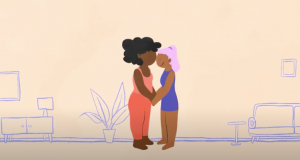
Still image from the animated video “LGBT+ and Covid-19: Stories from the UK and Brazil, and the Need for More Inclusive Crisis Responses”; by UoM & The Story (video/animation)
Our interviewees shared deep thoughts and moving stories with us. To increase awareness and visibility of their stories and reach wider audiences, we produced an animated video, highlighting some unique and important experiences of LGBTIQ+ people during Covid.
Understanding the utility of academic knowledge in social transformation, we produced policy briefs summarising our findings and providing recommendations for public authorities. We stressed the expertise and positive impact of LGBTIQ+ specialised services and movements as places not only for care and support but also for information and producing a sense of community. We also had meetings with LGBTIQ+ groups and organisations to discuss their practices and share our findings.
With the Centro de Referência LGBT do Rio de Janeiro – Capital 1 (LGBT Reference Centre of Rio de Janeiro 1), we discussed how the mental health of LGBTIQ+ people declined during the pandemic because of insecurity, unemployment, and violence. The Centre will develop groups on Wellbeing and Prevention for the most affected people in the region. The Centro de Referência, run by the Secretary of State for Social Care and Human Rights, is public and free, supporting LGBTIQ+ people with a multidisciplinary team (psychologist, social worker, lawyer, and admin staff).
The Grupo Conexão G de Cidadania LGBT de Favelas (Group Connection G for LGBT Rights in Favelas) have been offering food banks and in-person support in some of the most deprived areas of Rio de Janeiro, where State services are rare and police violence is common. They are preparing an innovative research project about LGBTIQ+ experiences in favelas with local research assistants, including qualitative and quantitative data and analysis. From our experiences of interviewing LGBTIQ+ people during the pandemic we were able to share learning and lessons of issues to be aware of in undertaking projects in this area.
We recognise that providing information is often only the beginning of meaningful engagement, and that there is much to be gained from conversations and two-way dialogue. The Voluntary and Community Sector Emergencies Partnership is a partnership of over 200 local and national voluntary and community organisations working together to provide more coordinated responses to crises in the UK, including Covid-19. We were invited to attend their network meetings and, in addition to presenting our research, we were able to discuss how our findings and goals aligned (or not) with existing knowledge and priorities in the sector. We discussed how our research might inform or support what the work emergency organisations and community groups were already doing in response to Covid. Importantly, we learnt about the often slow and difficult pathways to policy and practice change, re-emphasising to us the importance of producing tailored policy/practitioner outputs and seeking engagement beyond the university sector and academic publications.
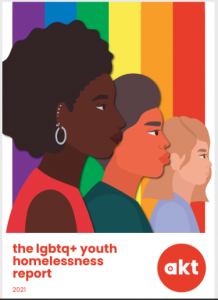
An akt report (2021) highlights experiences of LGBTIQ+ young people who have faced homelessness
What also became clear through our work was how inequalities relating to gender and sexual diversity inform so many other issues, and the importance of intersectional approaches. For example, akt is a UK charity focusing on LGBTIQ+ youth homelessness. While none of our participants were homeless themselves, we were able to share with akt insights into some of the housing and home-life challenges experienced by LGBTIQ+ people during lockdowns in the UK. This included younger and low-income people being forced to return home to live with unsupportive family, isolation of older adults living alone, and members of some faith groups experiencing homophobic households with no means of reprieve.
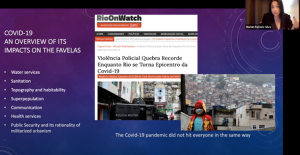
Mariah Rafaela Silva, Black trans activist and researcher (Grupo Conexão G & Universidade Federal Fluminense) presenting at the HCRI public seminar “LGBTQIA+ vulnerability and resilience during the Covid-19 pandemic”
Socially responsible work means not only intervening, but also transforming the university, opening it up to wider bodies, knowledge, and experiences. Therefore, we invited Brazilian activists to the HCRI public seminar “LGBTQIA+ vulnerability and resilience during the Covid-19 pandemic” to speak about their work protecting and promoting the rights of LGBTIQ+ people during the pandemic, in dialogue with academics based in Brazil and the UK. If the British context offered a privileged context for Covid-19 testing and vaccination, Brazilian experiences highlight the strength and resilience of state-funded LGBTIQ+ centres. In both cases, gender and sexuality should not be separated from other characteristics, such as race, class, nationality, disability, and more.
There is much to be done to improve the lives of LGBTIQ+ people during crises (including the current pandemic). We anticipate further collaborative actions into the future, and we invite the wider academic community to pay more attention to gender and sexuality in their work and support dialogue with diverse communities and groups.
Project duration: 2020-2021
Project lead: Billy Tusker Haworth (HCRI, UoM)
Audiences involved: Policy makers, crisis practitioners, LGBTIQ+ organisations, community groups, activists, students, international academics, and wider public.
Funding source: UoM ESRC IAA (Covid-19 rapid response)

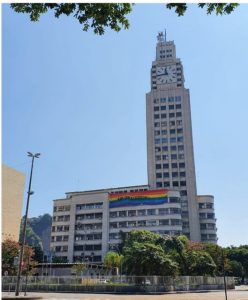
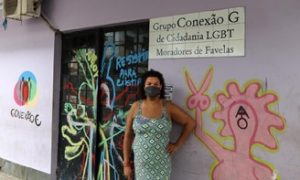
0 Comments